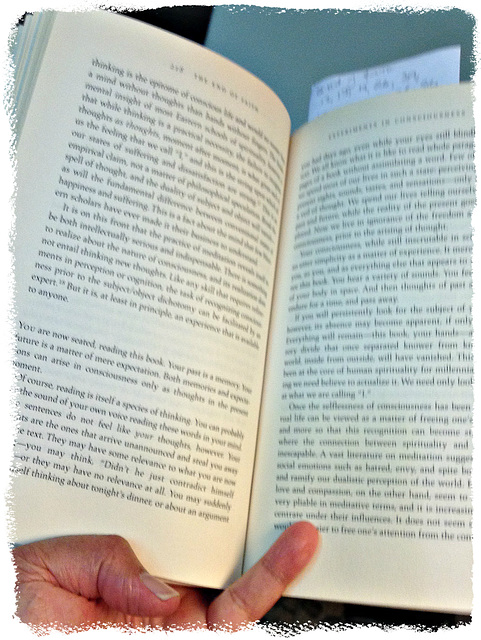Mentalese
MORAL TRIBES
Abraham & Isaac as seen by Kierkegaard
SENSATION
Myths
Richard Rorty quoted by Peter Watson *
ON THE BEACH
QWERTY / Panda's Thumb
Richard Rorty
Pollyanna
1913 / ೧೯೧೩
Churchill
Xenophobia
Brain
30
Newton and Evolution!
Post-modernism
Chaos & Complexity Theory
South-East Asian scripts of Indian origin
William Whewell - 1860
Sir John Herschel, Bt
EUROPE
Memories
Advantage Asia?
A Random Walk Down the Wall Street
How much pleasure do you get from your car?
Musings
See also...
Keywords
Authorizations, license
-
Visible by: Everyone -
All rights reserved
- Photo replaced on 29 Jun 2014
-
139 visits
- Keyboard shortcuts:
Jump to top
RSS feed- Latest comments - Subscribe to the comment feeds of this photo
- ipernity © 2007-2024
- Help & Contact
|
Club news
|
About ipernity
|
History |
ipernity Club & Prices |
Guide of good conduct
Donate | Group guidelines | Privacy policy | Terms of use | Statutes | In memoria -
Facebook
Twitter



Of course, reading is itself a species of thinking. You can probably hear the sound of your own voice reading these words in your mind. These sentences do not feel like your thoughts, however. Your thoughts are the ones that arrive unannounced and steal you away from the text. They may have some relevance to what you are now reading - you may think. “Didn’t he just contradict himself there?” – or they may have no relevance at all. You may suddenly find yourself thinking about tonight’s dinner, or about an argument you had days ago, even while your eyes still blindly scan lines of text. We all know what it is like to read whole paragraphs, and even pages of a book without assimilating a word. Few of us realizes that we spend most of our lives in such a state perceiving the present – present sights, sounds, taste, and sensations – only dimly, through a veil of thought. We spend our lives telling ourselves the story of past and future, while the reality of the present goes largely unexplored. Now we live in ignorance of the freedom and simplicity of consciousness, prior to the arising of thought.
Your consciousness, while still inscrutable in scientific terms, is an utter simplicity as a matter of experience. It merely stands before you, as you, and as everything else that appears to your notice. You see this book. You hear a variety of sounds. You feel the sensations of your body in space. And then thoughts of past and future arise, endure for a time and pass away.
If you will persistently look for the subject of your experience, however, its absence may become apparent, if only for a moment. Everything will remain – this book, your hands – and yet the illusory divide that once separated knower from known, self from world, inside from outside, will have vanished. This experience has been tat the core of human spirituality for millennia. There is nothing we need to believe to actualize it. We need only look closely enough at when we are calling “I” ~ Page 219
Once the selflessness of consciousness has been glimpsed, spiritual life can be viewed as a matter of freeing one’s attention more and more so that this recognition can become stabilized. This is where the connection between spirituality and ethics becomes inescapable. A vast literature on meditation suggests that negative social emotions such as hatred, envy, and spite both proceed from and ramify our dualistic perception of the world. Emotions such as love and compassion, on the other hand, seem to make our minds very pliable in meditative terms, and it is increasingly easy to concentrate under their influences. It does not seem surprising that it would b e easier to free one’s attention from the contents of thought, and simply abide as consciousness, if one’s basic attitude toward other human beings were positive and if one had established relationships on this basis. …… It also seems a matter of common sense that the more the feeling of selfhood is relaxed, the less those states that re predicated upon it will arise – states like fear and anger. Scientists are making their first attempts to test claims of this sort, but every experienced meditator has tested them already. While much of the scientific research done on meditation has approached it as a little more than a tool of stress reduction, there is no question that the phenomenon of selflessness has begun to make its way into the charmed circle of third-person experimental science. ~ Page 220
Sign-in to write a comment.